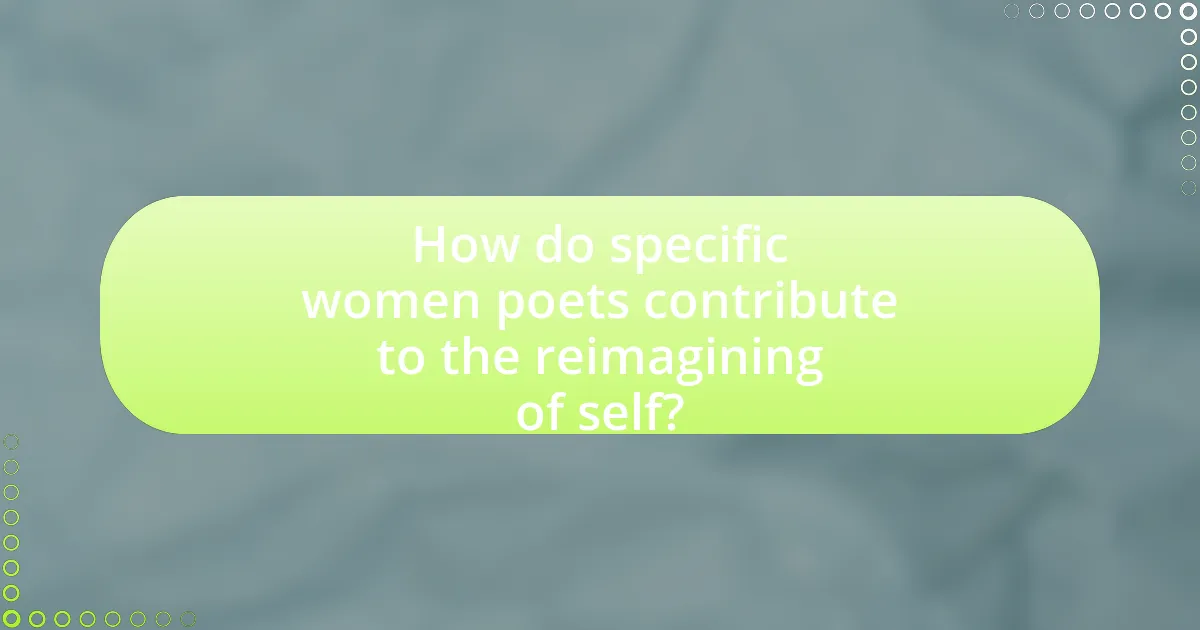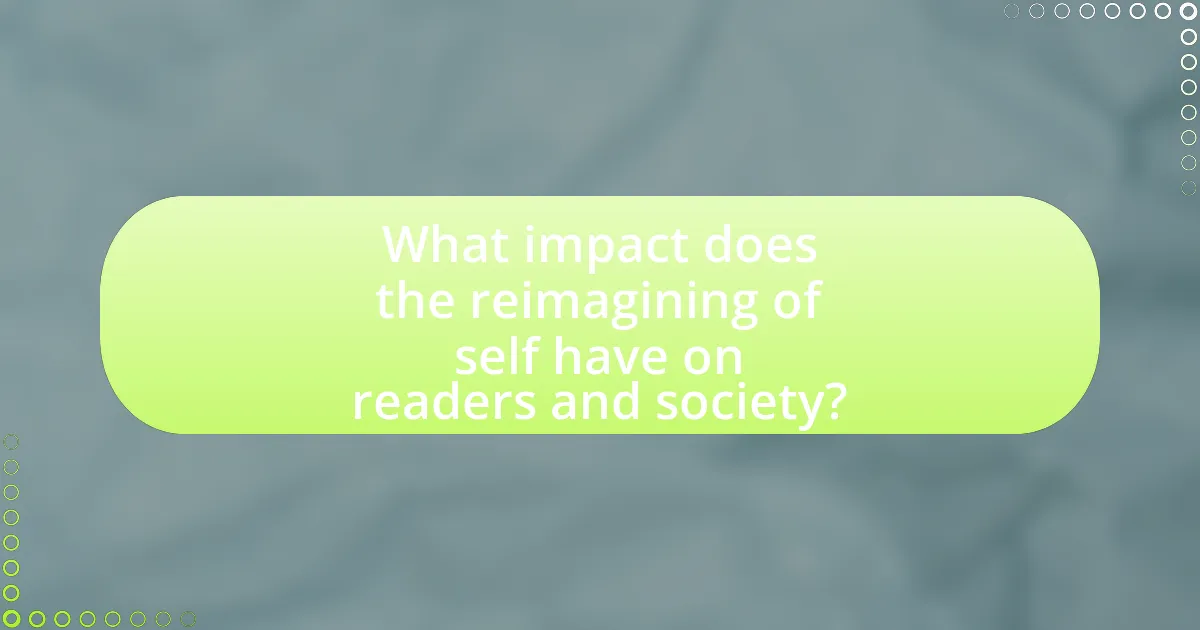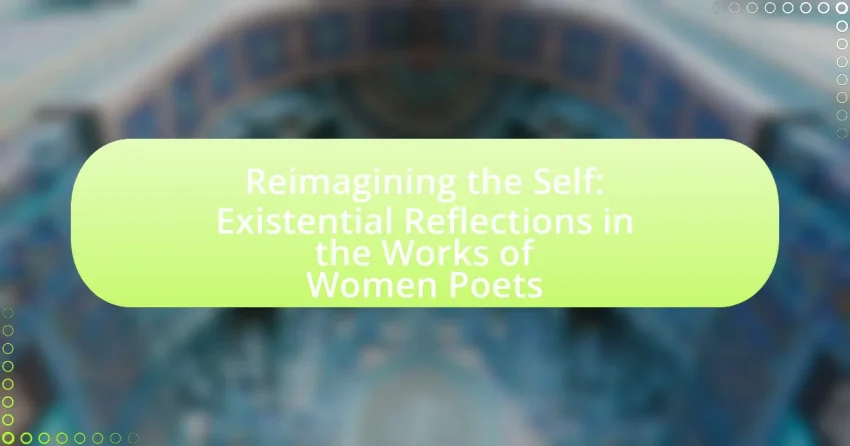The article “Reimagining the Self: Existential Reflections in the Works of Women Poets” examines how women poets explore and reconstruct identity through their poetry, often challenging societal norms and expectations. It highlights the significance of personal experiences in shaping self-perception and identity, with a focus on themes such as empowerment, autonomy, and intersectionality. Notable poets like Sylvia Plath and Audre Lorde are discussed for their contributions to existential themes, illustrating how their works reflect the complexities of selfhood and the impact of societal pressures. The article also addresses the challenges women poets face in expressing these themes and the broader implications of their work on readers and society.
What does ‘Reimagining the Self’ mean in the context of women’s poetry?
‘Reimagining the Self’ in the context of women’s poetry refers to the exploration and reconstruction of identity, often challenging societal norms and expectations. This concept allows women poets to express their personal experiences, emotions, and struggles, thereby redefining their roles and identities within a patriarchal framework. For instance, poets like Sylvia Plath and Audre Lorde utilize their work to confront issues of gender, race, and mental health, illustrating the transformative power of poetry in shaping self-perception and agency. This reimagining process is evident in the thematic focus on self-discovery, empowerment, and the reclamation of voice, which are prevalent in contemporary women’s poetry.
How do women poets approach the concept of self in their works?
Women poets often approach the concept of self through introspection, exploring identity, personal experience, and societal roles. They frequently utilize personal narratives and emotional depth to articulate their inner lives, as seen in the works of poets like Sylvia Plath and Audre Lorde, who delve into themes of mental health and intersectionality. This exploration is often framed within broader cultural and historical contexts, allowing for a multifaceted understanding of self that challenges traditional notions of identity. For instance, Plath’s “Lady Lazarus” reflects on rebirth and resilience, while Lorde’s poetry emphasizes the intersection of race, gender, and sexuality, illustrating how these factors shape one’s self-perception.
What themes are prevalent in the exploration of self by women poets?
Women poets frequently explore themes of identity, autonomy, and the intersection of personal and societal experiences in their works. These themes reflect the complexities of self-exploration, often addressing issues such as gender roles, cultural expectations, and personal trauma. For instance, poets like Sylvia Plath and Audre Lorde delve into the intricacies of mental health and the struggle for self-acceptance, while others, such as Maya Angelou, emphasize resilience and empowerment in the face of adversity. This thematic focus not only highlights individual experiences but also critiques broader societal norms, making the exploration of self a powerful vehicle for both personal and collective expression.
How do personal experiences shape the reimagining of self in poetry?
Personal experiences significantly shape the reimagining of self in poetry by providing authentic emotional and psychological contexts that poets draw upon to explore identity. These experiences serve as catalysts for introspection, allowing poets to articulate their struggles, triumphs, and transformations, which in turn fosters a deeper understanding of their own identities. For instance, the works of women poets often reflect personal narratives of societal challenges, such as gender inequality and cultural expectations, which influence their poetic voice and themes. This connection between lived experience and poetic expression is evident in the writings of poets like Audre Lorde and Sylvia Plath, who utilize their personal histories to confront and redefine their identities within the broader societal framework.
Why is existential reflection significant in poetry?
Existential reflection is significant in poetry because it allows poets to explore fundamental questions about existence, identity, and the human condition. This exploration often leads to a deeper understanding of self and society, as poets articulate their inner struggles and insights. For instance, the works of women poets frequently address themes of autonomy, societal roles, and personal agency, reflecting their unique experiences and perspectives. This significance is underscored by the ability of existential themes to resonate with readers, fostering empathy and prompting introspection about their own lives and beliefs.
What role does existentialism play in the works of women poets?
Existentialism plays a significant role in the works of women poets by exploring themes of identity, freedom, and the search for meaning in a patriarchal society. Women poets such as Sylvia Plath and Anne Sexton utilize existentialist ideas to confront personal and societal struggles, emphasizing the individual’s experience and the quest for authenticity. For instance, Plath’s poetry often reflects her internal conflicts and the pressures of societal expectations, illustrating the existential struggle for self-definition. This focus on personal experience aligns with existentialist thought, which prioritizes individual perspective and choice. Additionally, the existential themes in their works challenge traditional narratives, allowing women poets to assert their voices and redefine their identities in a male-dominated literary landscape.
How do existential themes manifest in the language and style of these poets?
Existential themes manifest in the language and style of women poets through the exploration of identity, the human condition, and the search for meaning. These poets often employ introspective language, vivid imagery, and fragmented structures to convey feelings of alienation and existential angst. For instance, the use of first-person narratives allows for a personal examination of existence, while metaphors related to nature and the body illustrate the connection between self and the world. The stylistic choices, such as enjambment and unconventional punctuation, reflect the chaotic nature of existential thought, emphasizing uncertainty and the fluidity of identity. This approach is evident in the works of poets like Sylvia Plath and Adrienne Rich, who articulate the complexities of selfhood and the struggle against societal constraints, thereby reinforcing the existential themes present in their poetry.

How do specific women poets contribute to the reimagining of self?
Specific women poets contribute to the reimagining of self by exploring themes of identity, personal experience, and societal roles through their unique voices. For instance, Sylvia Plath’s confessional style delves into the complexities of mental health and femininity, allowing readers to confront their own struggles with identity. Similarly, Audre Lorde’s work emphasizes the intersectionality of race, gender, and sexuality, encouraging a broader understanding of self that includes marginalized perspectives. These poets utilize their personal narratives and cultural contexts to challenge traditional notions of identity, thus fostering a space for readers to reflect on and redefine their own selves.
What unique perspectives do notable women poets offer?
Notable women poets offer unique perspectives that often center on themes of identity, personal experience, and societal critique. For instance, poets like Sylvia Plath explore the complexities of mental health and the female experience, while Maya Angelou addresses issues of race and resilience. These perspectives are shaped by their lived experiences, allowing them to articulate feelings of alienation, empowerment, and introspection in ways that resonate deeply with readers. Their works often challenge traditional narratives and provide insights into the intersectionality of gender, race, and class, as seen in the writings of Audre Lorde, who emphasizes the importance of embracing one’s multifaceted identity.
How does the work of Sylvia Plath reflect existential themes?
Sylvia Plath’s work reflects existential themes through her exploration of identity, isolation, and the search for meaning in a chaotic world. In her poetry and prose, Plath often delves into the inner turmoil of her characters, illustrating their struggles with self-identity and the absurdity of existence. For instance, in her poem “Lady Lazarus,” Plath confronts themes of death and rebirth, symbolizing the existential battle against despair and the quest for personal agency. Additionally, her semi-autobiographical novel “The Bell Jar” portrays the protagonist’s mental breakdown and alienation, highlighting the existential crisis of finding purpose in a conformist society. These elements demonstrate Plath’s engagement with existential philosophy, particularly the ideas of authenticity and the individual’s confrontation with their own existence.
In what ways does Maya Angelou’s poetry challenge traditional notions of self?
Maya Angelou’s poetry challenges traditional notions of self by emphasizing resilience, identity, and the complexity of personal experience. Her work often portrays the self as multifaceted, shaped by both personal and collective histories, which defies the simplistic, static definitions of identity. For instance, in her poem “Still I Rise,” Angelou asserts a powerful, defiant self that rises above oppression and adversity, illustrating the strength and agency of marginalized voices. This portrayal of self as dynamic and evolving contrasts with conventional views that often limit identity to fixed categories. Additionally, Angelou’s exploration of themes such as race, gender, and trauma further complicates traditional notions of self, inviting readers to consider the intersectionality of identity and the broader societal influences that shape individual experiences.
What techniques do women poets use to express existential reflections?
Women poets express existential reflections through techniques such as imagery, personal narrative, and symbolism. Imagery allows them to evoke complex emotions and abstract concepts, making existential themes more relatable; for instance, Sylvia Plath’s use of vivid imagery in “Lady Lazarus” illustrates themes of rebirth and identity. Personal narrative serves as a powerful tool for exploring individual experiences and existential dilemmas, as seen in the works of Maya Angelou, who often reflects on her own life struggles to address broader existential questions. Symbolism is frequently employed to convey deeper meanings, with poets like Adrienne Rich using symbols to represent societal constraints and personal liberation, thereby highlighting the tension between self and existence. These techniques collectively enable women poets to articulate their unique perspectives on existence and identity.
How does imagery enhance the exploration of self in their poetry?
Imagery enhances the exploration of self in poetry by creating vivid mental pictures that evoke emotions and personal reflections. Through specific and sensory details, poets can articulate complex feelings and experiences, allowing readers to connect deeply with the speaker’s inner world. For instance, in the works of women poets, imagery often reflects personal struggles, identity, and societal roles, making abstract concepts tangible. This technique not only enriches the emotional landscape of the poem but also invites readers to engage in their own self-exploration, as they relate their experiences to the imagery presented.
What role does metaphor play in conveying existential themes?
Metaphor serves as a crucial tool in conveying existential themes by enabling complex ideas about existence, identity, and the human condition to be expressed in relatable and vivid terms. Through metaphor, poets can illustrate abstract concepts such as alienation, freedom, and the search for meaning, making them accessible to readers. For instance, in the works of women poets, metaphors often reflect personal struggles and societal constraints, allowing for a deeper exploration of self and existence. This is evident in the poetry of Sylvia Plath, where metaphors of entrapment and rebirth encapsulate her existential dilemmas, illustrating how metaphor can encapsulate the nuances of human experience and existential inquiry.

What impact does the reimagining of self have on readers and society?
The reimagining of self significantly impacts readers and society by fostering greater self-awareness and empathy. This process encourages individuals to explore their identities and question societal norms, leading to a more inclusive understanding of diverse experiences. For instance, the works of women poets often challenge traditional narratives, prompting readers to reflect on their own lives and the lives of others. Research indicates that literature can enhance emotional intelligence; a study published in the journal “Science” found that reading literary fiction improves the ability to understand others’ emotions. This heightened empathy can translate into societal change, as individuals become more open to different perspectives and experiences, ultimately contributing to a more compassionate society.
How can poetry influence personal identity and self-perception?
Poetry can significantly influence personal identity and self-perception by providing a medium for self-expression and reflection. Through the exploration of themes such as love, loss, and empowerment, poetry allows individuals to articulate their emotions and experiences, fostering a deeper understanding of themselves. For instance, studies have shown that engaging with poetry can enhance emotional intelligence and self-awareness, as individuals relate to the sentiments expressed in the verses. Furthermore, women poets often challenge societal norms and expectations, encouraging readers to reconsider their identities and roles. This transformative power of poetry is evident in the works of poets like Audre Lorde and Maya Angelou, who use their writing to confront personal and collective struggles, ultimately reshaping how individuals perceive themselves within broader social contexts.
What are the psychological effects of engaging with existential poetry?
Engaging with existential poetry can lead to profound psychological effects, including increased self-awareness and emotional catharsis. This genre often confronts themes of meaning, existence, and identity, prompting readers to reflect on their own lives and beliefs. Research indicates that such reflective engagement can enhance emotional resilience and promote personal growth, as individuals grapple with existential questions and uncertainties. For instance, a study published in the Journal of Humanistic Psychology found that reading existential literature can facilitate a deeper understanding of one’s emotions and foster a sense of connection to broader human experiences. This connection can alleviate feelings of isolation and anxiety, ultimately contributing to improved mental well-being.
How does this poetry foster empathy and understanding in society?
This poetry fosters empathy and understanding in society by articulating personal experiences that resonate with diverse audiences. Through vivid imagery and emotional depth, women poets convey their struggles, joys, and reflections on identity, allowing readers to connect with their narratives on a human level. For instance, poets like Audre Lorde and Maya Angelou address themes of race, gender, and personal trauma, which invite readers to reflect on their own experiences and the experiences of others. This shared emotional engagement promotes a deeper understanding of different perspectives, ultimately fostering a more empathetic society.
What are the challenges faced by women poets in expressing existential themes?
Women poets face significant challenges in expressing existential themes, primarily due to societal expectations and gender biases. These poets often encounter limitations in their creative freedom, as traditional gender roles can restrict their exploration of complex existential questions. Additionally, the literary canon has historically marginalized women’s voices, making it difficult for their perspectives on existence to gain recognition. Research indicates that women writers frequently grapple with the pressure to conform to conventional themes, which can stifle their ability to delve into deeper existential inquiries. For instance, a study by the Modern Language Association highlights that women authors are underrepresented in discussions of existential literature, further complicating their efforts to articulate their experiences and insights on existence.
How do societal expectations shape the narratives of women poets?
Societal expectations significantly shape the narratives of women poets by influencing their themes, styles, and the subjects they choose to explore. These expectations often dictate the roles women are expected to fulfill, which can lead poets to either conform to or challenge these norms in their work. For instance, many women poets address issues such as gender inequality, domesticity, and identity, reflecting societal pressures and their personal experiences within those frameworks. Historical examples include Sylvia Plath and Adrienne Rich, whose poetry critiques traditional gender roles and explores the complexities of female identity, thereby illustrating how societal norms can be both a source of inspiration and a constraint.
What barriers exist in the literary world for women exploring these themes?
Barriers in the literary world for women exploring existential themes include systemic gender bias, limited access to publishing opportunities, and societal expectations regarding women’s roles. Systemic gender bias manifests in the underrepresentation of women in literary awards and critical reviews, which can hinder their visibility and credibility. According to a 2019 study by VIDA: Women in Literary Arts, only 30% of authors reviewed in major literary publications were women, indicating a significant disparity. Limited access to publishing opportunities is evident in the fact that women often face challenges in securing book deals compared to their male counterparts, as highlighted by the 2020 report from the Authors Guild, which noted that women authors earn less than men. Societal expectations further complicate this landscape, as women writers may feel pressured to conform to traditional narratives that prioritize domesticity over existential exploration, thereby restricting their creative freedom.
What practical insights can be gained from studying the works of women poets?
Studying the works of women poets provides practical insights into diverse perspectives on identity, resilience, and emotional depth. These poets often explore themes of personal and collective experience, reflecting on societal roles and challenges faced by women. For instance, poets like Sylvia Plath and Maya Angelou articulate struggles with mental health and racial identity, respectively, offering readers a nuanced understanding of these issues. Their works serve as a lens through which to examine the intersection of gender and societal expectations, revealing how personal narratives can challenge dominant cultural narratives. This exploration fosters empathy and encourages readers to reflect on their own identities and experiences in relation to broader societal contexts.
